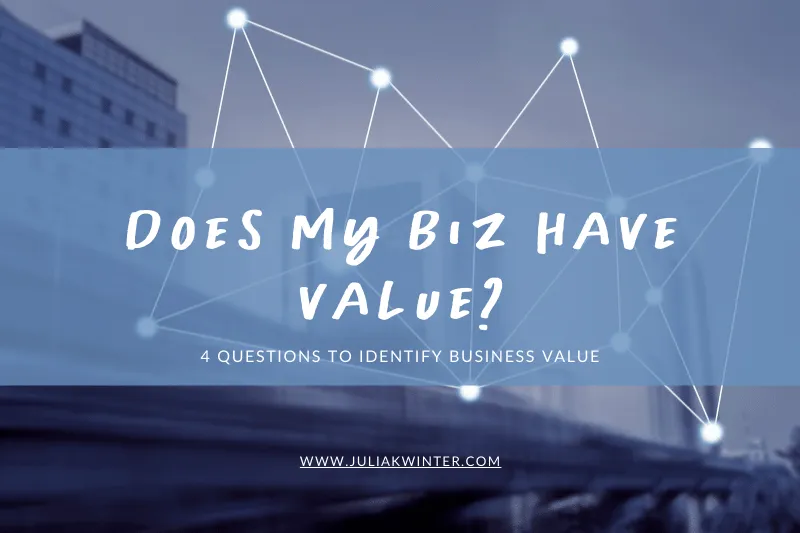
4 Questions To Ask To Identify Business Enterprise Value
Contents
Why you need to know whether a business has value
1. Would you give it away for free?
Don’t Miss an Opportunity to Ask Questions to Identify Business Enterprise Value!
Ready to Discover Value? GET YOUR FREE CHEAT SHEET.
Why you need to know whether a business has value
Many of my clients contemplating divorce don't know whether their family-owned business is worth something or not. And when you don't know if there's business enterprise value, how can you argue that there's something worth arguing about? I see you, and I get it.
Other clients want to calculate their net worth; you need to determine the business net worth to calculate your personal net worth.
What if I told you that there are some simple questions you can ask - and steps you can take – that don't have to be time-consuming or draining? From straightforward questions all the way up to reviewing tax returns, I have a few tricks up my sleeve…
What if I told you there are four secrets to identifying whether a business has value? Are you ready to save time and money, all while gaining a better understanding of the business's net worth? Then you are in the right spot!
Today, I am digging into the value identification tactics that will motivate you to uncover business enterprise value and move forward with negotiations or a business valuation! Regardless of what you do, here is my sure-fire way to ID market value.
1. Would you give it away for free?
Morgan's husband told her the small business they owned wasn't worth anything - the overall value was zero - so a business valuation wasn't necessary. It was an online service-based business with no hard assets but a decent market share. He said the maximum business enterprise value was the small amount of cash in the bank, and they couldn't sell the services firm with any success.
Morgan's husband owned the firm with a business partner. They had a dozen or so employees, one huge customer and a handful of small customers. She didn't have the information to paint an accurate picture or assert that a business valuation was needed.
I suggested to Morgan that she ask her husband: would he walk away from his 50% of the company for free? If the answer is no, you've uncovered there's something to value.
If a business has operations and provides its owners with some monetary benefits, there is something to measure, and a business valuation will help.
2. Does the owner make more than a job would pay?
Have you heard someone say that the business doesn't have any value because it's a one-person operation?
A sign that there is enterprise value is when the owner makes more profits than if they had a job doing the same thing.
- Julia Kwinter
Entrepreneurs create small businesses around their vocation because they can develop business value over and above the value of a salary.
An example would be a dentist who has their own practice versus a dentist who works for someone else. On average, a dentist that owns a practice will earn more than a dentist who works for someone else.
The extra cash in their jeans signifies that the company (in this case, a dental practice) has business value, and a business valuation will help determine that value.
3. Employees Equal Profits
Companies profit off their employees. It sounds kinda negative, doesn't it? But that's the main reason companies have employees, to make more money than you could on your own. The existence of employees demonstrates there is some level of financial success.
Sooo now that we're on the same page there, when a company has employees, it likely has business value. Mind you, that depends on how efficiently management runs the business, but more likely than not, if a company has employees, it has value. More often than not, the more employees, the more profit the business generates.
Let's use Morgan's situation as an example. In an IT consulting company, the IT personnel are paid an hourly wage, but the business clients are charged more per hour than the employee gets in their jeans. The difference between these two rates is the profit, and it is multiplied by the number of hours they work in a week and the number of weeks in a year.
If the business in your family requires a team to run it, take it as a sign a business valuation is your next step.
4. But the tax returns show there was no income!
You will see one of three scenarios on a tax return:
When the revenue generated by a business is greater than its costs, the business is profitable.
When the revenue generated by a business equals the costs, it "breaks even."
And when the costs are greater than the revenue, it generates a loss.
I've heard many business owners tell me that their business has no value because it isn't profitable. Even if the tax returns show low to no income after paying the expenses, the company may still have value.
What you see reported on tax returns doesn't necessarily show the true health of a business.
Because of tax planning methods, profitability can be understated on the financial statements or tax returns. What you want to estimate is the "income to owner," aka "seller's discretionary earnings." Review the historical data, specifically the financial statements, to calculate the income a new owner would earn. Income to owner is the business's income; add back taxes; add back owner's salary, and add back any expenses that are not required to run the business (like charitable donations) or are higher than market rates (such as inflated costs paid to other businesses you own). Examples of expenses that you might add back could be home office rent, rent paid to related companies, interest on loans to related parties etc.
After you estimate income to owner, the business might be more than profitable, indicating there is value to this business and a business valuation is the prudent next step.
There ya have it! My go-to ways to sleuth out whether a business has the potential to be valuable.

You now have the tools to think about the business from 4 angles and narrow down whether undertaking a business valuation appraisal makes sense. Asking these key questions can help you prepare for a comprehensive business valuation appraisal, ensuring you have a clear understanding of your company's true worth.
Don't Miss an Opportunity to Ask Questions to Identify Business Enterprise Value!
Because I want you to have a competitive advantage and I don't want you to miss the opportunity to ask the right questions, I've put together The Essential Cheat Sheet to Uncovering Business Value that will take you through each step in detail.
Ready to Discover Value? GET YOUR FREE CHEAT SHEET.
© 2022 Julia Kwinter. All Rights Reserved.


